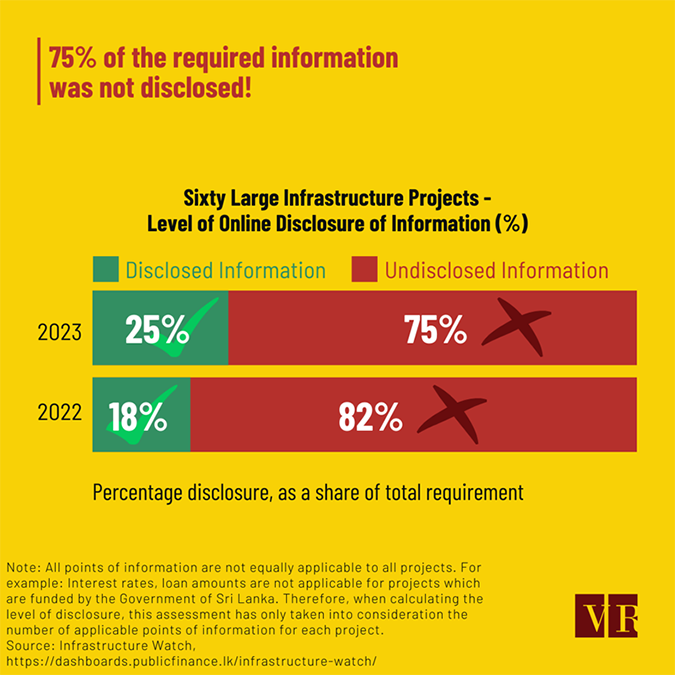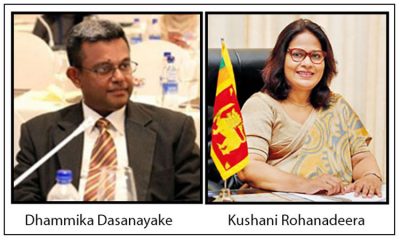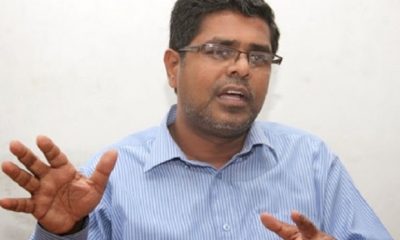News
Govt continues to violate RTI Act on infrastructure project info – Think Tank

Despite the Right to Information (RTI) Act’s proactive disclosure requirement, only 18% and 25% of information required to be disclosed on large-scale infrastructure projects was proactively disclosed online in 2022 and 2023 respectively, according to Verité Research.
Moreover, the information, when available online, was mostly in English – even though the RTI Act requires disclosure in Sinhala and Tamil. In 2022, 18% of the information was available in English, but only 5% in Sinhala and 4% in Tamil. This trend continued in 2023, where 25% was available in English, with only 8% in Sinhala and 8% in Tamil.
These findings are contained in Infrastructure Watch, a trilingual dashboard housed under Verité Research’s public finance.lk platform. It tracked government compliance with the RTI Act’s proactive disclosure requirements for 60 projects worth LKR 1.08 trillion in 2022, and 60 projects worth LKR 2.54 trillion in 2023. The 2023 assessment’s 60 projects comprised of 37 old projects from the 2022 assessment that were ongoing, as well as 23 new projects.
The assessment period for the 60 projects in 2022 was January – April 2022 and for 60 projects in 2023 was January – April 2023. The assessment considered only the proactive disclosure of information on the websites of the responsible Ministries and line-agencies.
Section 9 of the RTI Act No. 12 of 2016 mandates the Minister responsible for an infrastructure project to disclose project information. The information should be proactively disclosed for foreign and locally funded projects exceeding USD 100,000 and LKR 500,000 respectively, at least three months prior to commencement. The disclosures are to be made under 5 broad categories: project details, rationale and beneficiaries, budget and financial details, approvals and clearances, and procurements and contracts.
Sri Lanka’s large-scale infrastructure projects have been mired with allegations ranging from corruption, procurement malpractices, unreasonably high costs and negligence of negative environmental impacts. Loans undertaken to fund these projects during the past two decades have also contributed significantly to Sri Lanka’s debt burden.
Lack of transparency is a key enabler of many of the problems associated with infrastructure investments in Sri Lanka. The Right to Information (RTI) Act, brought into effect in 2016, attempted to change this by enabling public access to vital government information and empowering citizens to hold the government accountable.
Disclosure of public procurement contracts through an online fiscal transparency platform to reduce opportunities for corruption is also a commitment Sri Lanka has made with the IMF. Yet, the assessment revealed that a significant share of critical information important to improving infrastructure governance, such as project approvals and clearances and project procurement and contracts, remain hidden from the public. The government’s continued lack of transparency surrounding infrastructure projects therefore begs the question as to whether the government will continue to carry out its business behind closed doors, defying legal mandates.
News
US sports envoys to Lanka to champion youth development

The U.S. Embassy in Colombo welcomed the U.S. Sports Envoys to Sri Lanka, former National Basketball Association (NBA) and Women’s National Basketball Association (WNBA) players Stephen Howard and Astou Ndiaye, from June 8 through 14.
The Public Diplomacy section of the U.S. Embassy said that it would launch a weeklong basketball program intended to harness the unifying power of sports, made possible through collaboration with Foundation of Goodness and IImpact Hoop Lab.
While in Sri Lanka, Howard and Ndiaye, both retired professional basketball players, will conduct a weeklong program, Hoops for Hope: Bridging Borders through Basketball. The Sports Envoys will lead basketball clinics and exhibition matches and engage in leadership sessions in Colombo and Southern Province for youth aged 14-18 from Northern, Uva, Eastern and Western Provinces, offering skills and leadership training both on and off the court. The U.S. Envoys will also share their expertise with the Sri Lanka Basketball Federation, national coaches, and players, furthering the development of basketball in the country. Beyond the clinics, they will collaborate with Sri Lankan schoolchildren to take part in a community service project in the Colombo area.
“We are so proud to welcome Stephen and Astou as our Sports Envoys to Sri Lanka, to build on the strong people-to-people connections between the United States and Sri Lanka,” said U.S. Ambassador Julie Chung. “The lessons that will be shared by our Sports Envoys – communication, teamwork, resilience, inclusion, and conflict resolution – are essential for leadership development, community building, equality, and peace. The U.S. Sports Envoy program is a testament to our belief that sports can be a powerful tool in promoting peace and unity.”
News
Rahuman questions sudden cancellation of leave of CEB employees

SJB Colombo District MP Mujibur Rahuman in parliament demanded to know from the government the reasons for CEB suspending the leave of all its employees until further notice from Thursday.
MP Rahuman said that the CEB has got an acting General Manager anew and the latter yesterday morning issued a circular suspending leave of all CEB employees with immediate effect until further notice.
“We demand that Minister Kanchana Wijesekera should explain this to the House. This circular was issued while this debate on the new Electricity Amendment Bill was pending. There are many who oppose this Bill. The Minister must tell parliament the reason for the urge to cancel the leave of CEB employees,” the MP said.However, Speaker Mahinda Yapa Abeywardena prevented Minister Wijesekera responding to the query and said that the matter raised by MP Rahuman was not relevant.
News
CIPM successfully concludes 8th Annual Symposium

The Chartered Institute of Personnel Management (CIPM) successfully concluded the 8th Annual CIPM Symposium, which took place on 31st May 2024. Themed “Nurturing the Human Element—Redefining HRM in a Rapidly Changing World,” the symposium underscored the pivotal role of human resource management (HRM) in today’s dynamic global landscape. Since its inception in 1959, CIPM has been dedicated to advancing the HR profession through education, professional development, and advocacy, solidifying its position as Sri Lanka’s leading professional body for HRM.
Ken Vijayakumar, the President of the CIPM, graced the occasion as the chief guest. The symposium commenced with the welcome address by the Chairperson, Prof. Arosha Adikaram, followed by the Web Launch of the Symposium Proceedings and Abstract Book by the CIPM President. The event featured distinguished addresses, including a speech by Chief Guest Ken Vijayakumar, President of CIPM, and an address by Guest of Honor Shakthi Ranatunga, Chief Operating Officer of MAS Holdings Pvt. Ltd., Sri Lanka.
The symposium also featured an inspiring keynote address by Prof. Mario Fernando, Professor of Management and Director of the Centre for Cross Cultural Management (CCCM) at the University of Wollongong, Australia.
Vote of Thanks of the inauguration session was delivered by Dr. Dillanjani Weeratunga, Symposium Co-chair.
The symposium served as a comprehensive platform for researchers to present their findings across a wide range of critical topics in HRM. These included Cultural Diversity and Inclusion, Talent Development and Retention, Ethical Leadership and Corporate Social Responsibility, Adapting to Technological Advancements, Mental Health and Well-being at Work, Global Workforce Challenges, Employee Empowerment, and Reskilling and Upskilling.
The plenary session was led by Prof. Wasantha Rajapakse. Certificates were awarded to the best paper presenters during the valedictory session, followed by a vote of thanks delivered by Kamani Perera, Manager of Research and Development.
The annual symposium of CIPM was a truly inclusive event, attracting a diverse audience that spanned undergraduates, graduates, working professionals, research scholars and lecturers. This widespread interest highlights the symposium’s significance in the field of HRM, offering a unique opportunity for everyone to network and learn from scholarly brains.The CIPM International Research Symposium was sponsored by Hambantota International Port, Sri Lanka Institute of Information Technology (SLIIT), E B Creasy & Co. PLC, and Print Xcel Company.






















